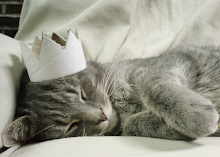
A wise friend of mine, a child therapist, Dr. Leah Levinger, had a method. Get rid of any book you haven't read in 5 years. I don't think that would work for me. I have a lot of books I reference and reread. But one of the teachers at the morning meditation group I go to donated 500 books a month ago to Symphony Space; and while my wife and son were out of the country for three weeks, I set a goal to match her number. And I did.
It helped organize the apartment but the paring wasn't that dramatic. The emptied bookshelves became sparse; the sparse became full, as I reorganized the overpopulation. There are a lot of paper citizens left, but they look and feel great, more ordered, in place.
This has been something I do from time to time; but this time took out a nice chunk. I am pleased.
I got rid of other things too. Magazines which would make a pile more than half as tall as me, do-hickies, thingamabobs, mementos, a lesser cello and bassoon we upgraded. And I remembered a warning, I think from a Feng Shui book, that when you get rid of a clutter of items, expect that right away you are going to need something you threw out.
Well, I did. I got rid of a dozen small picture frames. Then my wife returned with two sepia photos of her grandfather in his Buddhist robes which I wanted to frame.
I think there is part of one's old personality that wants to stay when we change. It likes to cling to possessions and habits and look for a way to say, "See, I did need that." And what the soul yearns for, it makes manifest.
We often have an ambivalence as we progress spiritually. We get rid of clutter, we let go of people we have outgrown, we eliminate poor food habits, we set new disciplines. But we need to not be afraid when afterward, these were not obviously the right decisions. They were.
It is quite the same with meditation. We think we have to think though something, try to remember something else, follow an interesting thought path that comes up, or even cut the meditation short to get some work done, write, make phone calls. But meditation begins as a letting go and focusing, noticing as your brain speed slows to alpha, delta, or Wow! theta; quieting the mind which says it needs its thoughts.
But if we persist, we find that we didn't need what we need. And we progress. We may find "the tunnel" and move up it to that other place. Or get clear messages, "Don't write that book now, move to Montana and raise goats," directions that go contrary to what seems right, but come from a place which connects to the universe, not our cluttered thoughts. And somehow we just know, that was the answer was right. Or we manifest the person or money or opportunity later in the day. But it will start with getting rid of the clutter. And it will often feel like a mistake as soon as we let go.
I am adding to this post afterward.
I started the original post the night before, finished it early that morning, then went off to my meditation group. After our meditation, people started talking about how they the liked the space we were in - the way the architect designed it in an oval, and it's comforting emptiness.
The leader then spoke about when people would visit her on Cape Cod years ago and loved her home. It had nothing in it. She had left New York and had sold her extensive collection of Chinese art, her books, furniture and much more.
Her friends thought she needed money and offered to buy her possessions and hold them for her until she could redeem them. But that wasn't the case. She just felt she wanted to let things go.
Her story was a nice, little coincidence to my writing this.








